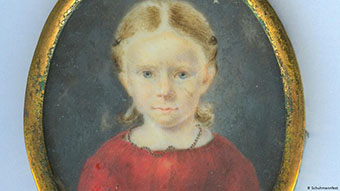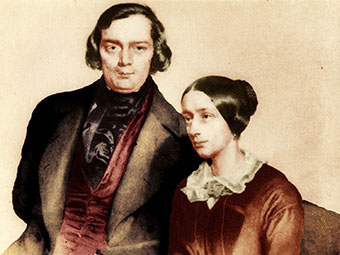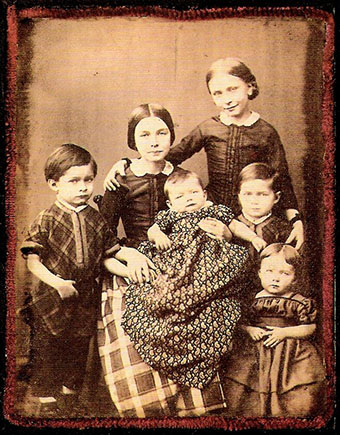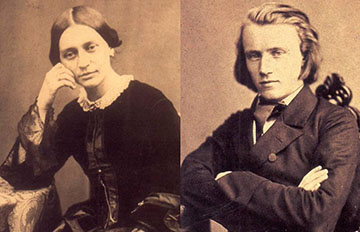Many music lovers only know a few things about Clara Wieck Schumann: that her father forbade her from marrying Robert Schumann, for instance, or that Brahms fell in love with her. But she was more than just a daughter, wife, and mother, and her life and career was more interesting – and consequential – than you might think!
Did you know these thirteen facts about Clara Wieck Schumann?

Portrait of Clara as a young girl © Schumannfest
1. Clara’s parents got divorced in her early childhood after her mother had an affair. Her father Friedrich Wieck was an abusive music teacher and piano store owner. Her mother Mariane Tromlitz Wieck was a singer. She ended up falling in love with a friend of Friedrich’s. The year Clara turned six, Friedrich and Mariane got divorced. Divorcing meant that Mariane was forced to give up custody of Clara.
2. Robert Schumann found Clara’s piano playing so incredible that he stopped studying law to study music with Friedrich instead. This happened in 1828, when Clara was only nine!

Robert and Clara Schumann © Lebrecht Music/Corbis
3. When Robert visited the Wieck family at home, he was deeply alarmed by what he witnessed. Schumann wrote that he saw Friedrich screaming at his nine-year-old son, who was practicing violin at the time: “You wretch, you scoundrel, is this the way you try to please your father?” Clara, clearly used to witnessing the abuse, just kept practicing. “Am I among human beings?” Schumann wrote in his diary in disbelief.
4. She started writing her piano concerto when she was 13 – and Felix Mendelssohn conducted the premiere. (Clara, of course, was the soloist.)
5. We know the date of Robert and Clara’s first kiss: it happened on November 25, 1835. Despite Friedrich’s best efforts to keep the couple apart, they married the day before her 21st birthday.

Robert and Clara Schumann’s children in 1854. (L–R) Ludwig, Marie, Felix, Elise, Ferdinand, and Eugenie. Julie and Emil are missing. © www.nataliakazaryan.com
6. During the 1849 May Uprising in Dresden, she masterminded a daring escape for her family. Revolutionary Guards were going door-to-door conscripting men to fight. At first she told them that Robert wasn’t home, but she knew she couldn’t lie indefinitely. So under the cover of darkness, she fled Dresden with Robert and her eldest daughter Marie, opting to leave her other three children behind so as not to rouse officials’ suspicions. But she returned the following day to rescue them, too. (Oh, and also, she was seven months pregnant at the time.)
7. Johannes Brahms saw Robert and Clara Schumann as two of his greatest musical mentors. They met when Brahms was 20, and Brahms ended up falling in love with Clara. In order to comfort her after Robert moved to a sanatorium, Brahms wrote her a set of variations on a theme by Robert. The piece is one of his most tragic compositions.
8. Her insults were legendary. She wrote that Richard Wagner’s Tristan und Isolde was “the most repugnant thing I have ever seen or heard in all my life” and observed that in Tannhauser, Wagner went “through the whole gamut of abominations.” She said of Liszt, “He has the decline of the piano on his conscience.” In 1843 Berlioz stopped by the Schumann house and she wrote of the visit, “He was unwell; nevertheless he could have behaved in a more friendly and sincere manner if his soul were truly inspired by art.”

Clara Schumann and Johannes Brahms, 1853 © Brain Pickings
9. Brahms fell in love with her daughter Julie. Unfortunately for him, he didn’t make his interest in her clear, and Julie married an Italian count instead. She died a few years later after giving birth.
10. Her reputation gave her leverage in negotiations. In 1878 she accepted a position teaching at the Konservatorium in Frankfurt, in part because the administration agreed to limit her teaching time to ninety minutes a day.
11. Clara Schumann managed Brahms’s investments – and she excelled at it. When Brahms’s publisher took over the responsibility, he did much worse.

© img.apmcdn.org
12. Her work ethic was famously intense. In 1883, at the age of 64, she played Beethoven with the Berlin Philharmonic the day after falling down a staircase!
13. She remained Brahms’s friend and inspiration until the end of her life. She died in May 1896 after suffering a stroke. Brahms was devastated and died less than a year later of pancreatic cancer. He had fallen in love with various women after Clara Schumann, but he never married any of them. Clara Wieck Schumann, it turned out, was a tough act for anyone to follow.

Clara Schumann was certainly a feisty and talented woman, especially in her day, making her a standout figure of the Romantic era. It’s interesting how the old school camp she and Brahms championed caused her to deride Liszt as having “the decline of the piano on his conscience” was so wrong, as his visionary works led to impressionism, atonal music, and as some music professors say, even laid the seeds for Jazz and Heavy Metal. There was no one who came close to Liszt’s prophetic influence on many future generations. https://youtu.be/D0PgMk8Ngd8
Very interesting article. I learned a lot. I didn’t know how dark Clara could be.
No mention of Robert having Syphilis or some of the children having congenial syphilis ?? I thought that Brahms helped the family financially after Robert’s death, that Clara declined his marriage proposal ??
She was also the first pianist to ask to have the piano placed behind the conductor (Frederic Cowen writes about this in his memoir—he was the conductor) instead of between the conductor and the orchestra. The practice, which was very practical, caught on.
That was very interesting.